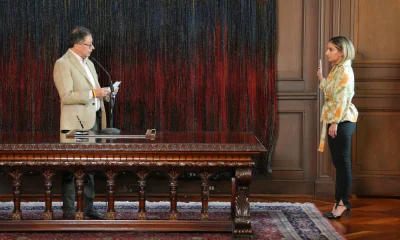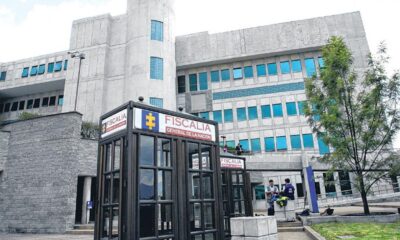International
Colombian JEP orders the arrest of Cauca’s governor

December 28 |
Colombia’s Special Jurisdiction for Peace (JEP) on Wednesday morning ordered the arrest of Clara Luz Roldan, governor of Valle del Cauca, in a case regarding the lack of protection for victims.
According to the sentence of the transitional jurisdiction, which emerged after the 2016 agreements, the local policy “puts at risk the guarantee of victims’ rights and the materialization of the Final Peace Agreement.”
In that sense, the JEP points out that Roldán would have incurred in lack of control in the fulfillment of the functions delegated to the Governor’s Office by the JEP to protect areas of forensic interest where victims of enforced disappearance could be found in that department.
Given this, the magistrates considered that “his lack of care puts at risk the guarantee of the rights of the victims and the materialization of the Final Agreement for Peace”, signed in 2016 between the Colombian State and the then FARC-EP.
According to the sentence Roldán will be deprived of her liberty for two days by order of the JEP, although in the interim hearings will be held between the jurisdiction and the Governor’s Office to review compliance with precautionary measures.
The Governor’s Office of Valle, as well as those of other departments, had committed with the JEP to advance actions for “the protection of the rights to truth and guarantees of satisfaction for the victims of forced disappearance”.
The particular case in which Roldán will be deprived of her liberty for two days by order of the JEP is about hearings between the jurisdiction and the Governor’s Office to review compliance with precautionary measures. The Governor’s Office of Valle, as well as those of other departments, had committed with the JEP to advance actions for “the protection of the rights to truth and guarantees of satisfaction for the victims of forced disappearance”.
The judicial proceeding was to take measures in 36 cemeteries in Valle del Cauca since there could be bodies of the so-called “false positives” or other victims of the armed conflict in Colombia.
The so-called “false positives” were extrajudicial executions of civilians by members of the Colombian Army who were then presented as guerrillas killed in combat in order to receive rewards or benefits.
According to the JEP, at least 6,402 innocent young people were deceived with promises of false jobs and executed by members of the Army to improve anti-guerrilla statistics and receive rewards in return.
International
Police investigate deaths of Rob Reiner and wife as apparent homicide

The Los Angeles Police Department (LAPD) is investigating the deaths of Hollywood actor and filmmaker Rob Reinerand his wife as an “apparent homicide,” amid a wave of tributes to the director of classics such as When Harry Met Sally.
According to U.S. media reports on Sunday, Rob Reiner and Michele Singer Reiner were found dead at their Los Angeles mansion with what appeared to be stab wounds.
Several political figures shared messages of condolence following the reported deaths of the director of A Few Good Menand his wife.
While the LAPD did not officially confirm the identities of the victims, it stated that homicide detectives were dispatched to the Reiner residence.
“At this time, no additional details are available and the investigation into an apparent homicide is ongoing,” the Los Angeles Police Department said in a statement posted on social media.
LAPD Deputy Chief Alan Hamilton told reporters that no arrests have been made and that no individuals are currently being questioned as suspects.
“I’m not going to confirm whether anyone is being questioned at this moment or not. We are going to try to speak with as many family members as we can,” Hamilton said.
CNN reported that a family spokesperson confirmed the deaths of Reiner and his wife.
California Governor Gavin Newsom, former U.S. President Barack Obama, and former Vice President Kamala Harrisissued statements expressing their condolences.
International
U.S. and Mexico Reach Deal to Address Water Deficit Under 1944 Treaty

The United States and Mexico have reached an agreement to comply with current water obligations affecting U.S. farmers and ranchers and for Mexico to cover its water deficit to Texas under the 1944 Water Treaty, the U.S. Department of Agriculture said in a statement.
The department уточified that the agreement applies to both the current cycle and the water deficit from the previous cycle.
On Monday, U.S. President Donald Trump accused Mexico of failing to comply with the water-sharing treaty between the two countries, which requires the United States to deliver 1.85 billion cubic meters of water from the Colorado River, while Mexico must supply 432 million cubic meters from the Rio Grande.
Mexico is behind on its commitments. According to Washington, the country has accumulated a deficit of more than one billion cubic meters of water over the past five years.
“This violation is severely harming our beautiful crops and our livestock in Texas,” Trump wrote on Monday.
The Department of Agriculture said on Friday that Mexico had agreed to supply 250 million cubic meters of water starting next week and to work toward closing the shortfall.
Agriculture Secretary Brooke Rollins, quoted in the statement, said Mexico delivered more water in a single year than it had over the previous four years combined.
Trump has said that if Mexico continues to fall short of its obligations, the United States reserves the right to impose 5% tariffs on imported Mexican products.
Mexico’s Deputy Foreign Minister for North America, Roberto Velasco, said that a severe drought in 2022 and 2023prevented the country from meeting its commitments.
International
Several people shot in attack on Brown University campus

Several people were shot on Saturday in an attack on the campus of Brown University, in the northeastern United States, local police reported.
“Shelter in place and avoid the area until further notice,” the Providence Police Department urged in a post on X. Brown University is located in Providence, the capital of the state of Rhode Island.
U.S. President Donald Trump said on his social media platform Truth Social that he had been briefed on the situation and that the FBI was on the scene.
At 5:52 p.m. local time (11:52 p.m. GMT), Brown University said the situation was still “ongoing” and instructed students to remain sheltered until further notice.
After initially stating that the suspect had been taken into custody, Trump later posted a second message clarifying that local police had walked back that information. “The suspect has NOT been apprehended,” the U.S. president said.
-

 International4 days ago
International4 days agoWashington declares State of Emergency as atmospheric river brings severe flooding
-

 International4 days ago
International4 days agoU.S. to require five-year social media history from tourists under Visa Waiver Program
-

 International3 days ago
International3 days agoCuba battles out-of-control dengue and chikungunya epidemic as death toll rises to 44
-

 Central America3 days ago
Central America3 days agoHonduras election crisis deepens as CNE president denounces intimidation attempts
-

 Central America4 days ago
Central America4 days agoOAS and EU urge honduran political actors to respect vote results and avoid unrest
-

 International3 days ago
International3 days agoColombia says it would not reject Maduro asylum request as regional tensions escalate
-

 International2 days ago
International2 days agoSeveral people shot in attack on Brown University campus
-

 International3 days ago
International3 days agoEcuador on track for record violence as homicides hit highest level in Latin America again
-

 International4 days ago
International4 days agoSix ecuadorian soldiers jailed pending trial for alleged extrajudicial execution
-

 International2 days ago
International2 days agoU.S. and Mexico Reach Deal to Address Water Deficit Under 1944 Treaty
-

 Central America12 hours ago
Central America12 hours agoPanama seizes over three tons of drugs hidden in Caribbean port container
-

 Central America5 minutes ago
Central America5 minutes agoOAS urges swift recount in Honduras as election results remain uncertain
-

 International2 minutes ago
International2 minutes agoPolice investigate deaths of Rob Reiner and wife as apparent homicide

































































































